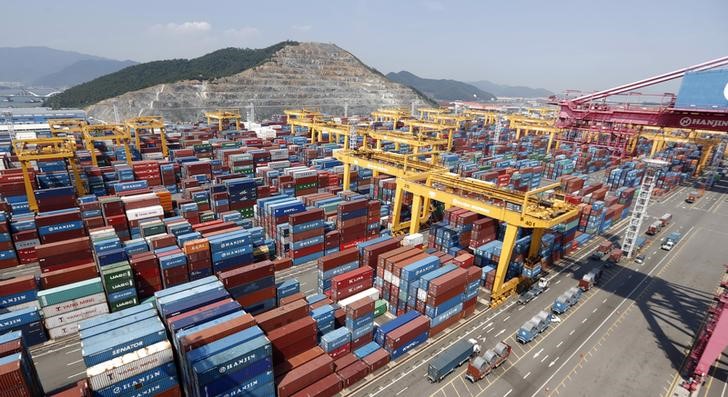(Bloomberg) -- South Korea slipped into a recession in the second quarter, official data are expected to show Thursday, after its no-lockdown strategy and stimulus failed to offset a slump in exports.
Gross domestic product is expected to have fallen 2.4% last quarter from January-March, according to a median estimate of economists surveyed by Bloomberg. A negative outcome would mark the first recession since 2003.
South Korea took an alternative approach to handling the virus crisis, leaning on mass testing and contact tracing instead of shutting down large swathes of the economy. The government also took various initiatives to boost consumption, handing out cash to all households and encouraging retailers to offer promotions. The fiscal stimulus pledged so far amounts to 14% of GDP.
South Korea Passes Third Extra Budget to Boost Virus-Hit Economy
Yet a contraction in activity is deemed inevitable, with all-but-one of 17 economists expecting such an outcome. Widespread caution among South Koreans put a cap on spending, while lockdowns elsewhere in the world hit global trade.
“The sharp contraction in exports has offset the tentative recovery in South Korea’s domestic demand and pushed the economy into recession,” said Tieying Ma, an economist at DBS Bank. Exports have fallen by double digits through April-June.
Preliminary data compiled by the finance ministry show consumption improved steadily last quarter. Credit card approvals rose 9.3% in June from a year earlier, but tourism has almost ground to a halt. Chinese visitor numbers have fallen by 99% from the previous year in each month since March.
Early Recession Exit
Korea’s downturn, however, is expected to be shorter and less painful than in other countries. Most economists see growth returning in the current quarter.
Economists expect South Korea’s economy to shrink 0.6% this year, smaller than the -4.9% expected for Japan, -5.8% for Singapore and -5.5% for the U.S.
Korea is well positioned for a second-half rebound from the exports of semiconductors and its economic ties with China, the only major economy forecast to grow in 2020, according to Rory Green, an economist at TS Lombard.
“Consumer and business sentiment has now bottomed, and I expect the economy to bounce back strongly as global demand slowly recovers,” Green said. South Korea’s semiconductor industry will benefit from the global shift to working from home, and exports to China look set to strengthen amid Beijing’s infrastructure stimulus, he added.
Lingering Uncertainty
Uncertainty lingers, with a resurgence of the virus the major risk to the outlook. Spiraling caseloads in Hong Kong and Australia -- both previously lauded for their successes -- are a warning that the situation can quickly change.
Government policy focus needs to pivot from helping businesses and households survive the pandemic, toward preparing for a post-pandemic world. The implementation of President Moon Jae-in’s New Deal initiative to reshape the economy around tech and green industries will be scrutinized for its effectiveness in supporting growth, said Kyle Ferrier, Director of Academic Affairs at Korea Economic Institute of America.
©2020 Bloomberg L.P.
